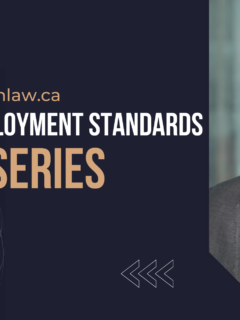Wrongful dismissal does not mean what you think it means. ❌ Wrongful dismissal does not mean that an employee was wrong to fire someone. ✅ Wrongful dismissal means an employee was not provided with enough reasonable notice of their termination when they were fired. In other words, wrongful dismissal is when an employee was not …
If a statutory holiday falls on a weekend, then employers have to give their employees another day off with pay. Likewise, if a statutory holiday falls on a day that is not normally worked by employees (even if it is not a weekend), then employers similarly have to give those employees another day off with …
A small percentage of employers across Canada are regulated by the Federal Canada Labour Code (“CLC”), and not provincial employment standards. Employers in the following industries are, generally, regulated by the CLC: Employers in the above industries who are governed by the CLC and not provincial employment standards have special layoff rules. To learn about layoffs under …
Is it illegal to fire an employee when she is pregnant? No, it is not always illegal to fire an employee who is pregnant. Employers can lawfully terminate an employee who is pregnant so long as the reason for the termination was unrelated to the pregnancy. Employers in Ontario can fire an employee at any …
What happens if you must take a day or two off because your child is sick with the cold or flu? In Ontario, generally, your job is protected for up to three days per year to care for a sick child. Ontario’s Employment Standards Act, which is legislation that protects workers, has a special program called Family …
Yes, a worker can quit their job due to stress and still receive employment insurance (“EI”) if they can prove that they had no reasonable alternative but to resign. Normally, workers who quit their job voluntarily are not entitled to EI. However, workers who quit can access EI regular benefits if they had “just cause” …
Has your new employer asked you to deposit a check in your bank account so you can send the money back to it or one of its clients with bitcoin or gift cards? If you answered yes, run. It is a scam. There is really no more analysis needed. You do not need to read …
Employment restrictive covenants are terms and conditions of employment (usually inserted in an employment contract) that restrict employees when they leave the employer. By way of example, a non-compete clause is a restrictive covenant that purports to prohibit employees from competing with their ex-employer for a set period after they resign or are terminated. Restrictive …
What is an employment class action lawsuit? An employment law class action is a lawsuit where a representative employee is authorized by the court to sue an employer on behalf of numerous other employees. Employees who participate in class actions are called Plaintiffs and they act as “Class Representatives” and sue on behalf of themselves …
Yes, you can get employment insurance (“EI”) regular benefits if you have “just cause” to quit your job. However, if you do not have so-called “just cause” to quit, and you quit your employment voluntarily, you will not be eligible for EI regular benefits. The Government of Canada will reject your application. What are EI …









